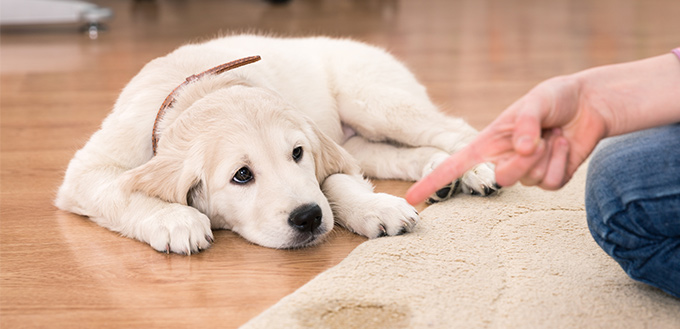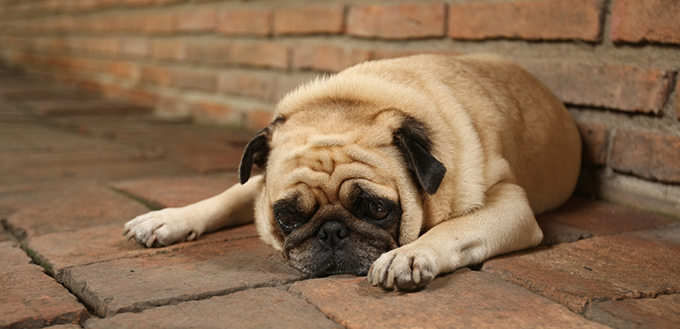You have been absent for a couple of hours only to come home and find out that your pooch has completely ruined your favorite armchair? It is only natural to react and raise your voice to criticize them. However, a couple of seconds later you notice that your pet bows his head and has that familiar hangdog look. Did he actually realize he did something wrong and he is now feeling guilty?
Do Dogs Feel Guilt?
The question is, if dogs can feel guilt at all. It may all look convincing, but the experts claim that they are only reacting to the body language and the negative energy you are sending. Many studies confirm that dogs can feel and express happiness and sadness, as well as other primary emotions. However, guilt belongs to a group of secondary emotions which are a bit more complex than that. According to scientists, your pet needs to be extremely self-aware and cognitively sophisticated to experience guilt, pride, or jealousy, which are secondary emotions. In other words, while it is not impossible, it is unlikely that your dog is expressing or feeling guilt.

Why Does He Have That Look Then?
It doesn’t take to be an expert to notice that your dog’s behavior changes when you are reprimanding them. You can notice that their face looks “guilty” or at least that is what you think. They will look at the floor and avoid eye contact, their heads will bow, and their ears will lower. Some of them may also hide their tail between legs and, even if they look at you, it would be with those puppy eyes you can’t resist.
The key to the mystery actually lies in the last part of the previous sentence. Dogs are aware that you are expressing negative emotions because they can read body language. On top of that, they can feel the energy in the room is not exactly positive. Some experts believe that the “guilty” look is just a way of them letting you know that you are in charge. They are telling you they are aware you are upset and that you should stop yelling now.
The thing is that most owners do just that! According to recent research, approximately 60% of dog owners confirmed that they would stop criticizing their pet if they notice they are exhibiting something that reminds of guilt. However, they are not aware that their furry friends just figured out their weakness and that they can make the reprimanding stop by offering a hangdog look in return.
Other scientists take a softer approach and claim that your dog wants you to stop yelling because he is afraid. According to them, it is the fear that they are experiencing and they are acting like that because they realize that you are mad and they are scared.
The Owners Tell a Different Story!
Remember the story about a ruined armchair from the beginning of the article? That has been happening ever since dogs have been domesticated and it will continue happening in the future. If you ask the owners, they could swear that they “felt” their dog expressed guilt for what he did. The signs may vary as some dogs were incredibly quiet and avoided eye contact while others were looking at their owners with sadness in their eyes.
Regardless of what scientists claim, there are owners that are convinced their dogs are feeling and expressing guilt. Truth to be told, there are some professionals who agree with this and claim that there is no study that can explicitly confirm that dogs are incapable of experiencing shame. After all, jealousy is a secondary emotion, too, and we have seen it in many dogs, haven’t we?
Although many studies were conducted, we are still not (completely aware) of the complexity of a dog’s brain and what he is capable of. There seems to be no record of brain imaging or a similar study that would confirm they can or can’t feel guilt. The results of various studies are mixed, and their conclusions cannot be considered as facts, but just assumptions.
Just for the fun of it, let’s take a look at some situations when dogs might feel and show guilt:
- Pooping on the floor
- Ripping apart the trash
- Chewing through a piece of furniture
Related Post: Dog Proof Trash Cans

How to Correct Your Dog’s Bad Behavior
Regardless of whether he can experience guilt or not, the chances are it won’t stop your dog from ripping your furniture again when you are not around. That is why the crucial thing to do is to find a way to stop that kind of behavior. Now, there might not be anything you can do when you are not around, but when you are at home, try to catch your dog chewing on something he shouldn’t chew. As soon as you notice what is happening, take away the item and replace it with a chew toy. Alternatively, you can even give him a treat, but do not forget to scold him before that.
The crucial thing to remember is that you shouldn’t confuse your pooch. The only thing that he is allowed to chew on should be his toys and treats and nothing else. Avoid offering him an old shoe even though you might think it will keep him busy. The explanation needs to be clear so that he would remember it at all times.
Next, try to understand the cause of your dog’s bad behavior. In the case of chewing, it may be that he is bored, so make sure that he has enough toys. In some cases, you might have left him plenty of things to ruin, and he just couldn’t resist. Next time, do a better job of dog-proofing your home before you leave. You may even consider keeping your dog in a single room or a restricted area where he doesn’t have anything to chew. However, this method is not exactly humane, and you should avoid it if possible.
Related Post: Best Chew Toys for Puppies
Sources:
- Jason G. Goldman, Do Dogs Feel Guilty?, Scientific American
- Lynn Buzhardt, DVM, Guilty or Innocent? Do Pets Know They Have Done Something Wrong When They Act “Guilty”?, VCA Hospitals







